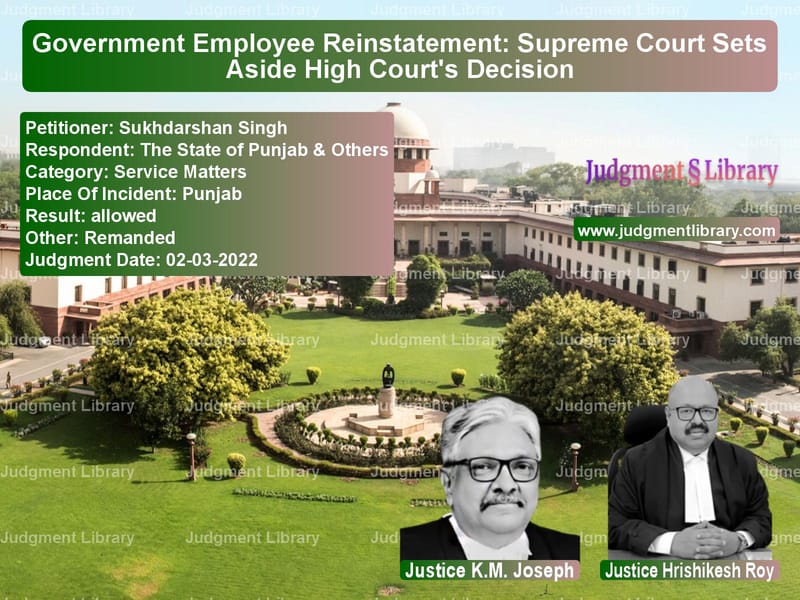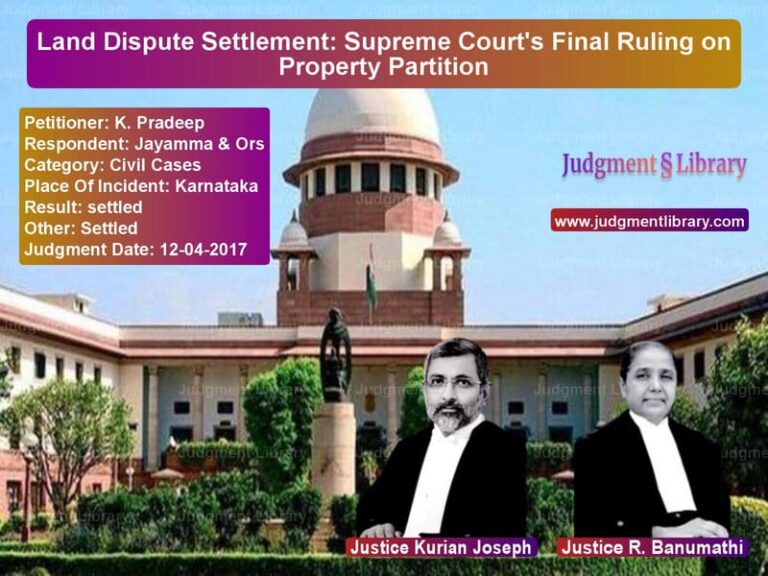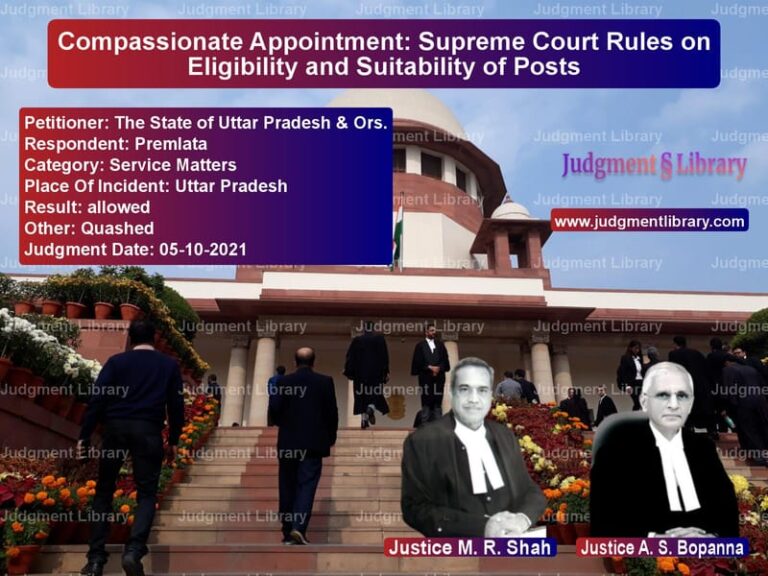Government Employee Reinstatement: Supreme Court Sets Aside High Court’s Decision
The case of Sukhdarshan Singh vs. The State of Punjab & Others revolves around the termination and subsequent reinstatement of a government employee following criminal proceedings. The Supreme Court was called upon to decide whether the Punjab and Haryana High Court had correctly interpreted service rules in denying back wages for the period of suspension.
This judgment is significant as it clarifies the application of Punishment and Appeal Rules, 1970 and Punjab Civil Services Rules in cases of wrongful termination and reinstatement.
Background of the Case
The appellant, Sukhdarshan Singh, was employed as a clerk in the State Transport Department of Punjab. He faced two separate criminal cases that led to his suspension and eventual termination. The key events in the case are as follows:
- December 27, 1979: Appointed as a clerk in the State Transport Department.
- September 2, 1986: Suspended following an FIR related to embezzlement.
- October 6, 1988: Chargesheet filed in the case.
- 1995: A second FIR registered under Sections 307 and 506 of IPC.
- September 17, 1996: Conviction in the second FIR.
- July 24, 2002: Served with a show-cause notice under Punjab Civil Services (Punishment and Appeal) Rules, 1970.
- March 13, 2003: Terminated from service.
- December 22, 2006: Acquitted in the first FIR.
- April 9, 2008: High Court upheld conviction but reduced sentence in the second FIR.
- January 29, 2009: Appellate authority reinstated the appellant but denied back wages, declaring the period as ‘dies non’.
- March 3, 2022: Supreme Court ruled on the appeal.
Legal Issues Considered
- Whether the High Court erred in denying back wages following reinstatement.
- Whether the appellate authority had the power to impose ‘dies non’ for the period of suspension.
- Whether the termination was justified under Punjab Service Rules.
- Applicability of Rule 7.3 and Rule 15(v)(f) of the Punjab Civil Services Rules.
Petitioner’s Arguments (Sukhdarshan Singh)
- The termination was wrongful and was set aside by the appellate authority.
- The appellant was acquitted in the first FIR, and his sentence was reduced in the second.
- Once reinstated, the appellant was entitled to full back wages as per service rules.
- The appellate authority had no power to impose dies non as a penalty under the 1970 Rules.
Respondent’s Arguments (State of Punjab)
- The appellant had been convicted under Sections 324 and 506 IPC, making reinstatement discretionary.
- The appellate authority exercised leniency in reinstating him and was justified in imposing ‘dies non’.
- The High Court correctly ruled that back wages were not automatically payable.
- Rule 7.3-B allows the competent authority to determine if the suspension period should be treated as duty.
Supreme Court’s Judgment
The Supreme Court bench, comprising Justices K.M. Joseph and Hrishikesh Roy, ruled in favor of the appellant, setting aside the High Court’s judgment.
1. High Court Misinterpreted Service Rules
“Once the appellate authority found the termination flawed and ordered reinstatement, denying back wages as a form of punishment was impermissible.”
The Court ruled that back wages should not be denied unless specifically provided by service rules.
2. Appellate Authority Lacked Power to Impose ‘Dies Non’
“The appellate authority was clearly acting beyond its jurisdiction in declaring the period as ‘dies non’.”
The Court found that ‘dies non’ is not a penalty under Rule 5 of the 1970 Rules.
3. Reinstatement Must Include Salary for Suspension Period
“Once reinstated, an employee is entitled to full salary for the period unless otherwise decided by a competent authority through due process.”
The Court ruled that the appellant must be paid for the period of wrongful termination.
4. Directions for Fresh Consideration
“The competent authority shall reconsider how the period till reinstatement is to be treated and provide consequential benefits.”
The Supreme Court directed the respondent to determine back wages within three months.
Key Takeaways from the Judgment
- The Supreme Court reaffirmed that service rules must be strictly followed in disciplinary proceedings.
- Appellate authorities cannot impose penalties not prescribed under service rules.
- Reinstated employees are entitled to full back wages unless the employer establishes an exception.
- Service rules must be interpreted in a pro-employee manner where wrongful termination is proven.
Implications of the Verdict
This ruling has significant implications for government employment and service law:
- Public servants cannot be arbitrarily denied back wages after reinstatement.
- Authorities must exercise disciplinary powers within prescribed limits.
- Government employees wrongfully terminated can claim full benefits upon reinstatement.
Overall, this Supreme Court ruling ensures that government employees receive fair treatment when their terminations are reversed and safeguards against arbitrary administrative decisions.
Petitioner Name: Sukhdarshan Singh.Respondent Name: The State of Punjab & Others.Judgment By: Justice K.M. Joseph, Justice Hrishikesh Roy.Place Of Incident: Punjab.Judgment Date: 02-03-2022.
Don’t miss out on the full details! Download the complete judgment in PDF format below and gain valuable insights instantly!
Download Judgment: sukhdarshan-singh-vs-the-state-of-punjab-supreme-court-of-india-judgment-dated-02-03-2022.pdf
Directly Download Judgment: Directly download this Judgment
See all petitions in Employment Disputes
See all petitions in Disciplinary Proceedings
See all petitions in Termination Cases
See all petitions in Judgment by K.M. Joseph
See all petitions in Judgment by Hrishikesh Roy
See all petitions in allowed
See all petitions in Remanded
See all petitions in supreme court of India judgments March 2022
See all petitions in 2022 judgments
See all posts in Service Matters Category
See all allowed petitions in Service Matters Category
See all Dismissed petitions in Service Matters Category
See all partially allowed petitions in Service Matters Category







